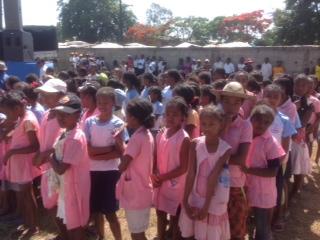Reaching the Unreached: Expanding Access to HPV Vaccine in Madagascar
April 24th, 2018 |
Human papillomavirus (HPV) vaccine protects women from the most dangerous strains of the virus, which lead to approximately 70 percent of cervical cancer cases worldwide. Last year, it was estimated that 1,804 of the 3,194 women in Madagascar who suffered from cervical cancer died.
The government of Madagascar (GOM) conducted a series of pilot vaccine introductions to identify the best way—given the financial, human resource, and health system constraints—to reach the more than 7 million women who are at risk of contracting HPV.

From 2013 to 2015, JSI, with funding from Gavi, the Vaccine Alliance and in partnership with the Ministry of Health and WHO, supported the initial pilot of the HPV vaccine in two districts in Madagascar (Toamasina and Soaviandrina). The pilot, supported by the First Lady of Madagascar, was the first step on the planned national scale-up of the HPV vaccine to 22 regions of Madagascar by 2021.
The HPV vaccine is administered to girls between the ages of 9 and 13. Since this population is much older than the typical target for routine vaccination, innovative solutions and cross-sector collaborations are essential for scale-up. The GOM coordinated a multi-partner HPV pilot committee with representatives from immunization and infectious diseases, adolescent services, education, and partner organizations.
“It is essential that part of the introduction strategy development includes district-level micro-planning and includes church representatives, school directors, parents’ association members, and community leaders so that all stakeholders are informed and receive the same information,” says Dr. Marius Rakotomanga, former EPI director. Strategies included:

Madagascar’s experience during its initial introduction of the HPV vaccine can inform countries that are planning similar introductions. These lessons can guide vaccine introduction planning and identify ways to facilitate coordination with multiple stakeholders to reach the target population.
Gavi estimates that by 2020, it will provide HPV vaccinations to 40 million girls and prevent an estimated 900,000 cases of cervical cancer. Many African countries, Madagascar included, are preparing to implement school-based delivery of HPV vaccine, which also requires outreach to girls who are not in school and integration of the vaccine in the routine immunization system. The HPV vaccine is not only a cost-effective method to prevent the economic burden of cervical cancers; it also protects against other types of cancers and symptoms of HPV, such as pelvic inflammatory disease.
Written by Jaures Rabemanantena, Hanta Raharisoa, Molly Ferguson, and Natalie Palmer
We strive to build lasting relationships to produce better health outcomes for all.